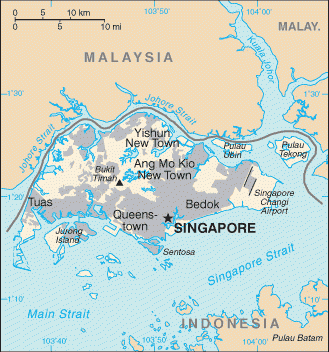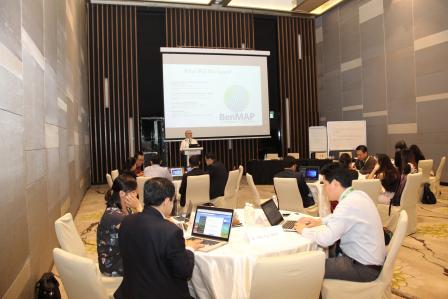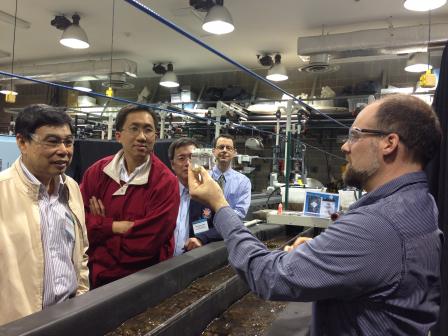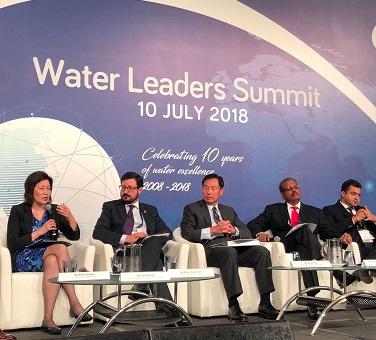EPA Collaboration with Singapore

Demonstrating Leadership in Environmental Protection
Singapore, a small nation of 700 square KM, plays a large role in environmental leadership in the region. EPA and Singapore are cooperating to enforce environmental laws, improve air quality, protect drinking water, and reduce exposure to toxic chemicals. This cooperation helps to implement the Memorandum of Intent Between the United States of America and the Republic of Singapore on Cooperation in Environmental Matters.
Explore our work in Singapore:
- Building Strong Institutions and Legal Structures
- Improving Air Quality for a Healthier Tomorrow
- Expanding Access to Clean Water
- Reducing Exposure to Toxic Chemicals
Building Strong Institutions and Legal Structures
Singapore and EPA recognize the importance of effective enforcement of environmental law. In 2017, the Singapore National Environment Agency (NEA) participated in a regional inspections workshop hosted by EPA and EPA Taiwan. Course participants from Singapore, Thailand and Vietnam learned practical principles and skills for conducting environmental inspections.
EPA and NEA are also active in the Asian Environmental Compliance and Enforcement Network (AECEN), which brings together enforcement officials from 13 countries to improve compliance with environmental laws and policies in Asia.
Learn more:
Improving Air Quality for a Healthier Tomorrow
 The U.S. and Singapore jointly deliver a training course on air quality and health in September 2016.
The U.S. and Singapore jointly deliver a training course on air quality and health in September 2016.The World Health Organization estimates that urban air pollution caused 3.7 million deaths in 2012, over one-third of which were in Southeast Asia. To raise awareness about the linkages between air quality and health, in 2015 and 2016 EPA was part of a joint U.S. and Singaporean team which trained Southeast Asian officials on tools to estimate the health impacts of poor air quality. Among the tools EPA shared during the training was BenMAP, an open-source computer program that calculates the number and economic value of air pollution-related deaths and illnesses. These courses were part of the U.S.-Singapore Third Country Training Programme.
Learn more:
Expanding Access to Clean Water
 EPA and Singapore PUB discuss stream monitoring techniques.
EPA and Singapore PUB discuss stream monitoring techniques.According to the United Nations, the Asia-Pacific region is home to 60% of the world’s population, but it has only 36% of its water resources. In Singapore, most of the water supply is either imported or reclaimed through methods like desalination.
Since 2013, EPA and Singapore PUB (Singapore’s National Water Agency) have been supporting clean drinking water research in the U.S. and Singapore through collaboration and information exchange on topics such as water contamination detection, water reuse, and management of algal blooms. As part of this cooperation, in 2016, EPA partnered with ZWEEC (one of PUB’s private sector partners). EPA and ZWEEC are jointly assessing a new water monitoring technology that could quickly detect contamination in drinking water systems.
 EPA’s Principal Deputy Assistant Administrator for International and Tribal Affairs, Jane Nishida, spoke about water efficiency and reuse at the Water Leaders’ Summit during Singapore International Water Week in July 2018.
EPA’s Principal Deputy Assistant Administrator for International and Tribal Affairs, Jane Nishida, spoke about water efficiency and reuse at the Water Leaders’ Summit during Singapore International Water Week in July 2018.Photo Credit: U.S. Embassy Singapore
Learn More:
Reducing Exposure to Toxic Chemicals
EPA and Singapore are committed to working together to protect our communities from toxic chemicals. EPA is combining our computational and toxicological expertise with the biomedical research capabilities of Singapore’s Agency for Science, Technology and Research (A*STAR). In 2016, EPA partnered with A*STAR to develop and use new approaches to evaluate the safety of chemicals, with a focus on developing predictive models for kidney, liver, and developmental toxicity. This collaboration aims to develop more efficient and economical ways to evaluate the potential health effects of chemicals to protect human health.
